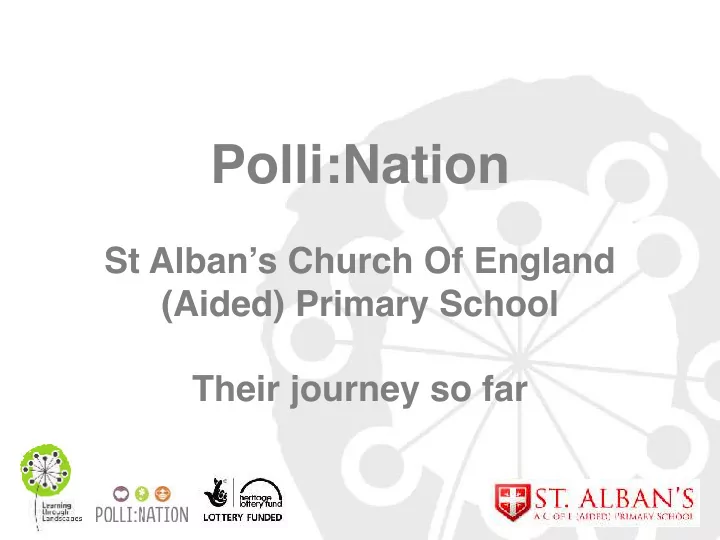

Polli:Nation St Alban’s Church Of England (Aided) Primary School Their journey so far
‘Pollinators are very important for our environment and the state of the world. Polli:Nation gives people the chance to make a difference. Both people and pollinators need more colour in the world.’ Isabella, age 11 Polli:Nation and Gardening Ambassador
Polli:Nation aims to:- • Effect culture change by engaging and enthusing children and young people to protect pollinating insects; • Increase the abundance and diversity of pollinating insects in school grounds and local community spaces.
Why? • To address the decline in the UK’s pollinating insects; • To bridge the gap between children and conservation opportunities; • To broaden children’s understanding of the links between pollination and food security; • There is a need for more trained data recorders and skilled conservationists in the UK.
How? • Being one of the successful 260 schools across the UK with a grant of £1100; • Transforming our school grounds; • A network of knowledgeable and enthused educators, volunteers and children; • A generation of Polli:Nation activists; • Sharing best practice in our school, community and clusters of schools; • A collaboration, including outside agencies.
What? • Supportive Senior Management • Whole school Trailblazer (outdoor learning) links:- 1.Improve feeding and shelter habitats of pollinators through (child initiated) projects in the grounds and local community 2.Increase awareness of Trailblazer/Polli:Nation, including through the use of communication technology/ media 3.Increase uptake of Trailblazer scheme, linking Polli:Nation with the Science Curriculum
What? Teachers embedding into their planning Polli:Nation Ambassadors The Hive/SuperHive leading pupil voice and linking with the School Council and Gardening Clubs Recruiting volunteers from the community Linking to the RHS award scheme and other partners
1. Engagement and behavioural change The staff engaged with Polli:Nation Let pupils Whole bring staff Buddy up! school on board focus days Talks from Practical 256 knitted charities to gardening bees for inform and support identification inspire
2. Identifying and recording the natural heritage The Children took part in t he OPAL survey each year
2. Identifying and recording the natural heritage Bumblebee Conservation Trust Beewalk in a local cemetery Monthly recording focusing on bumblebees but identifying other species
3. Conserving and restoring the natural heritage The £1100 grant provided :- Nectar – through flowering plants all year; Shelter – through the use of perennial plants rather than just annuals and a meadow area; Nesting – in our bee/insect wall Corridors - through our borders being planted and long grass areas being designated.
4. Developing volunteers’ skills • An ex student designed a garden for our front border to communicate the message that we value wildlife.
‘Our front border transformed from being bland to welcoming to humans and pollinators. Our new head of year wants us to transform the Year 7 picnic area; we know how to make it pollinator-friendly and beautiful.’ Esther T - Year 6
5. Learning and resources Polli:Nation linked to the curriculum: Maths
5. Learning and resources Polli:Nation linked to the curriculum: Art
Polli:Nation linked to Science and Computing Year 4 Watch The Video
Polli:Nation linked to able learners: ‘ It took a lot of hard work producing the video, as we Flying High Day - Pollinator Promise had to plan it and things Video went wrong. Now our video is more complex and people want to watch it, and like Pfizer, we hope others will join in. It just started with the phrase ‘metre by metre’ and then it expanded – more parents asking, and it went from there.’ Katie-Anne Year 6
Polli:Nation linked to Food Technology Thank you bees for helping us to grow: Strawberries Peas Beans Edible flowers Herbs Tomatoes
6. Evaluation We know this has had an impact on children because: “ Look at the beauty Nanny. “ Oh, so that’s Shall we go the pretty way? why they’ve been nagging me to Oh, just look at those pollinators plant stuff in the - the bees like these flowers garden! ” Nanny.” Parent Patrick, Year R
Pollinator patches Dear Pollinator promise team Our patch is coming on very well thanks. Our summer bulbs have come up, the bees love the lillies. We made a herb planter from an old BBQ and the pond is great for the tadpoles and the newt we found in a bucket at the end of the garden. We made a bee house at Grandad's house that we've now hung up. We've really enjoyed looking after our patch and and mummy likes it too! February June Love Sam and William xx
Recommend
More recommend